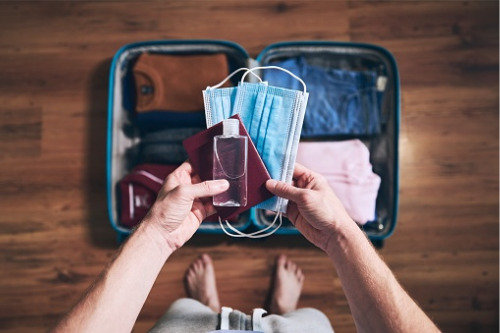

2020 saw international travel grind to a halt for all but the most essential trips - however, the mass vaccination rollout across the globe is giving travellers hope that 2021 might be the year that everyone can start booking their flights again.
Despite this, travel insurers and experts suggest that it could take several years for travel to become ‘normal’ again, and they say that areas of corporate travel may never recover to pre-COVID levels.
Commenting on what future international travel might look like, Céline Fornaro of UBS Securities says a vaccination programme will certainly ‘reassure everyone’, and that domestic and leisure travel is likely to pick up fast once countries around the world get the virus under control. However, she says corporate travel will ‘stay on the backburner’ for some time yet, with businesses likely to rely on the remote tools they've worked so hard to implement over the past year.
Read more: Travelers see 25% fall in quarterly profit
“We will definitely not lose some of these habits that we’ve gained through Zoom or online calls, and engaging with people without meeting them,” she explained.
“We see that there are some places that will never fully go back to being physically in the office, whereas others are looking at three days a week. The same time next year, I hope that I’ll have done a couple of leisure trips - but from a corporate travel point of view, it’ll just be the beginning of international travel returning.”
CNN business correspondent Richard Quest said that for smaller countries like New Zealand and Singapore, re-starting travel will be easier than it will be in places like Europe, or the Americas. He also agreed that business travel is likely to drop off significantly, and stay low for a substantial period of time - something the travel sector will need to adjust to.
“Australia and New Zealand have a travel bubble which is brewing nicely, but everywhere else - it’s not easy,” Quest said. “When you have a small area which is easier to control, then you can put various COVID measures in place. However, it gets complex when you start talking like large continents like the European Union which is putting its ‘green pass’ together right now.”
“Whether we’re talking about the US, UK, EU, Australia or New Zealand, we know from the statistics that there is a massive pent-up demand for travel. But the fundamental premise that business travel will not go back to where it was is absolutely accurate.
“The two-day trip to Sydney, or the day trip from Christchurch to Auckland - that’s not going to happen anymore. We’ve shown that we can do those trips though Zoom, Skype, Team, etc. Leisure is going to be huge, but the problem is that you don’t get the same yield with leisure travel through the airlines and the hotels.”
Commenting on what the future of international travel will look like in one to two years, Cover More general manager - underwriting and product Eftim Stojanov says that we are likely to see more ‘travel bubbles’ and bi-lateral agreements between ‘safe’ countries.
Meanwhile, countries that are still struggling to keep COVID-19 under control will likely be ‘blacklisted,’ and will become much more difficult to travel to.
“I think what we’ll see over the next few years will be similar to what is happening right now,” Stojanov commented.
“There are countries that have been blacklisted where COVID-19 is rampant and out of control, and unfortunately due to the vaccine rollout and other political factors, poorer countries are likely to suffer for longer than the ‘wealthier’ countries.”
Read more: Travel sector urges Pacific Islands bubble
“Countries like the UK and US will bring COVID under control much faster, and then we’re likely to see bi-lateral agreements between those countries which are considered ‘safe’,” he continued.
“Those countries will then open up their borders before the others, until there is such a certainty that everyone has brought the virus sufficiently under control.”
Stojanov says this process is likely to go one for at least another two or three years, and for New Zealand, it looks like the Trans-Tasman bubble will be our only opportunity for international travel for some time yet.
“When the pandemic started, we all thought it would go away within a year, and to some extent, there is some disbelief around how long this has lasted,” Stojanov said. “We’ve moved forward on the vaccination front, but we have not really moved forward on the freedom of movement front.
“The Trans-Tasman bubble is probably the most significant bubble in the history of bubbles, but international travel will depend on a number of factors - the rollout of the vaccination programmes across the globe, and how well each country can demonstrate that they have control over the virus. We will then see more bi-lateral agreements, and that won’t mean complete freedom of movement, but it will allow people to travel.
“Nonetheless, this will all take some time. With New Zealand, I think we are unlikely to see more significant travel until at least next year.”
